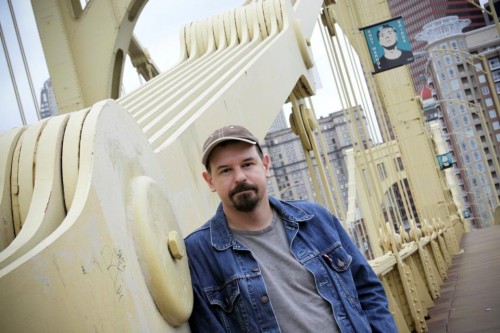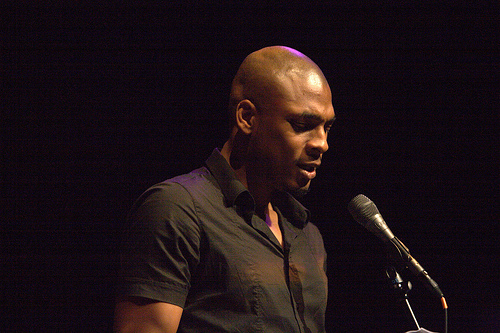Dear Paul, Dear Terrance
by Sampsonia Way / November 8, 2011 / No comments
Pittsburgh poet Terrance Hayes and Flemish novelist Paul Mennes were the inaugural authors in a new city-to-city “writer residency exchange” between City of Asylum/Pittsburgh and Het Beschrijf of Brussels. Hayes spent a month in Brussels last summer, and Mennes recently left Pittsburgh after two months on Sampsonia Way. Ilke Froyen of Het Beschrijf asked each writer to pen a letter to the other, about their views of their respective cities. The letters were published in Dutch in Standaard der Letteren, a Belgium newspaper and in The Pittsburgh Post Gazette.
Dear Terrance,
The first time we spoke was in Brussels. You had come from Pittsburgh, Pennsylvania, and were going to stay in the Passa Porta writer’s flat for a month. Some time later I would visit the U.S.A. and stay in Pittsburgh to work on a novel. It was an uncharacteristically sunny day for a Belgian summer. We sat at a table on a rooftop. There was white wine and a lot of good will. I sometimes doubt whether there is any point to writing. That afternoon we were surrounded by people who believe that writing is important. The interview was conducted in English, Dutch, French and occasionally some Spanish. It’s amazing how people can get along if a there is little good will involved. Perhaps it was the white wine.
The second time was in a restaurant. I tried to describe the charm of Brussels to you because I was afraid an American would find our capital provincial. I thought it better not to mention the violence and discord that sometimes crop up in Brussels. ‘The Martyrs Square, for example, is wonderful as long as you look in the right direction,’ I said, ‘but if you turn your head 90 degrees, you will see inexplicable decay.’ I pointed to an old-fashioned neon sign for a shop across the street that sold working clothes. ‘There,’ I said, ‘Palais du Cache Poussier. Perhaps this is the best way to sum up Brussels: the grandeur of dust on neon.’
You talked about Pittsburgh and asked if I was interested in sports. Of course you couldn’t possibly know that the day after graduating from high school, without shedding a tear, I had said a final goodbye to everything involving sport. ‘Sport, especially American football, is important in Pittsburgh’, you said. I nodded and decided to try and make the best of things anyway.
A few months later it was my turn. I didn’t expect much of Pittsburgh. The city has a reputation. Long ago it was a centre of the steel industry. What I read made me think of Sheffield or Charleroi, which, not by coincidence, are twin cities to Pittsburgh. In the [1860s] someone described your home as hell without a lid, a reference to the thick clouds of smog over the city. The most famous Pittsburgher is Andy Warhol. Who abandoned it for New York as fast as he could.
North Side, my home for the next eight weeks in hell without a lid, turned out to be amazingly green and terrifyingly friendly. During my daily walk to the grocery store I passed gardens where anyone could just walk in and out. But you were not allowed to pick or taste anything growing there. And to my surprise everyone seemed to stick to the rules.
Granted, there were quite a few empty houses. Many windows were boarded up with chipboard. It was a shame that the Garden Theater opposite Allegheny Commons Park, which appeared to have been closed for quite some time, looked so dilapidated. Actually it reminded me slightly of Brussels.
During the first few days I felt uncomfortable as I walked around. As a Belgian, I made no eye contact with anyone on the street and didn’t venture out without my iPod. At home these are clear signals: that I will only mind my own business and expect everyone else to do the same. It was a strategy that did not work in Pittsburgh. While I was waiting for the bus perfect strangers said hello and asked me how I was. I was shocked. The earplugs of my iPod didn’t seem to put anyone off, in fact they just made people to speak louder. Whenever I mumbled something back, people immediately asked me where I was from. Sometimes someone took a guess based on my accent. ‘Are you a kraut?’ I was successively outed as Dutch, Danish and Russian. And often the person talking to me would then describe himself as an Irish or Italian-American. Usually he had never even visited Irelandor Italy, but said he would like to do so some day.
And they always asked where I lived in Pittsburgh. When I told them Northside, their faces clouded. I understood that Northside was not a good neighbourhood. There are problems with drugs and robberies, especially at night in and around the park. ‘That’s okay,’ I said, thinking of Brussels and Antwerp, ‘I don’t really go looking for things in a park in the middle of the night.’ It took me a week to realise that most residents of Northside are black. And that everyone who warned me was white.
And you were right. Sport is important here. I noticed this every time I encountered hordes of sports fans as I made my way from Downtown to Northside. Everyone except me was going to PNC Park, a baseball stadium with a capacity of almost 35,000. It’s home to the Pirates, who are very important, as are the Penguins ice hockey team. But it’s the Pittsburgh Steelers who have the status of super heroes. GO STEELERS! is a slogan that you see on T-shirts, posters, caps with and without fake hair, illuminated news trailers, salt and pepperpots and buses. The heyday of the steel industry may be over but the Steelers souvenir trade is a worthy successor. I myself sought instruction and fun in the Warhol museum near the baseball stadium.
In the future, when everyone has had their fifteen minutes of fame and we all go back to the affairs of the day, Pittsburgh will no longer be weighed down by its reputation as a declining industrial city. Hell without a lid is in the throes of being restyled and the first results show a pleasant city with a surprisingly rich and diverse cultural life. GO NORTH SIDE!
Dear Paul,
It was wonderful to receive your letter. I have returned to Pittsburgh now and look forward to meeting you for beer at Park Brugge, a wonderful neighborhood bar that specializes in Belgian beer. It is the only place in Pittsburgh that sells Tripel Karmeliet, a beer I first sampled at the Poechenellekelder, one of the famous old bars of Brussels. I remember not only the Poechenellekelder’s eccentric décor (an assortment of trinkets, marionettes, and costumed Mannekin Pis dolls), but also the neighborly faces throughout the bar. Tourists and locals seemed indistinguishable amid the laughter and warmly lit wood furnishings.
Your cordial letter reminds me of Brussels’s constant friendliness. I never found the city provincial though I met many who, like you, were highly self-conscious about Brussels. Many of the people I met seemed to have difficulty understanding why anyone would visit the city. They suggested I visit Antwerp, Ghent, and Brugge – strikingly different Belgian cities that were within hours by train. Often the conversation would turn to Belgium’s diminutive dimensions.
At a pizzeria in Saint Gilles one night, my new German friend, who I’d met at an art gallery that afternoon, debated the size of Belgium with his friends. “It’s the size of Maryland,” he insisted. Someone else in the group argued it was the size of Rhode Island. “You can probably drive across Los Angeles in the time it takes to drive across all of Belgium,” I was told. “With or without traffic?” I asked. “You can drive across all of Belgium in three hours,” Simon’s girlfriend said. “I thought it was an hour and one half,” someone else interjected. “When I return with my family, I will make the drive and report back to you,” I laughed.
I assured them I liked Brussels enough to return. Yes, Brussels is a small city in a small country, but it never seemed provincial. The city reminds me of Washington DC because of its mix of expatriates, bohemians, professionals, government workers, service workers and natives.
During my stay I heard Congolese, German, and Spanish in addition to Dutch and French. I am aware of Brussels’s turbulent cultural history, but I saw the co-existence of so many languages and people as evidence of the city’s openness and complexity.
Just as you feared I’d find Brussels provincial, I feared you’d find Pittsburgh small and uninteresting. Andy Warhol once said Pittsburgh is a place you only want to be from. Though it is no longer “hell without a lid,” its winters remain so brutal commercials for cold and flu medicines are filmed here. The city’s industrial strength, working-class image conceals its homey charms. Bountiful bridges stretch across the three rivers. The neighborhoods maintain distinct cultural identities. And as you noted in your letter, you can find a parade of Steeler t-shirts, jackets, hats and jerseys everywhere. When the Steelers are winning games, the city feels wonderfully unified. Of course beneath the uniform unity, you can find the same social and economic discord that exists in Brussels and elsewhere.
There are the same dangers waiting down dark alleys, but I believe an alert and careful person can go just about anywhere. I found this to be true in Brussels. Walking the city alone I found amazing shops of books, art, vinyl records, Tintin comics, waffles, and Manekin Pis souvenirs. It’s true I was never out alone after sundown, but the July sun sets late in Brussels. As late as 10 pm the sky still held a faint lavender glow. As I sat writing by the window of my flat late into the night, I could hear the city’s energetic bustle.
Perhaps the liveliness of Brussels has to do with the commingling of so many cultures in a small geographic space. Or perhaps being the overlooked neighbor of Paris, Berlin, and Amsterdam has made the people of Brussels supernaturally hospitable. A French bookmaker friend invited me to a Sunday brunch that included a Hungarian graphic artist, a deejay from the Philippines, an Algerian nurse, a Korean chef and a Dutch painter with her two-year old daughter. The loft was a swirl of languages and charity as the friends shared food and conversation. You might assume that motely group welcomed me as a sort of fellow expatriate artist, but I experienced the same warmth in the homes of native Belgians.
I recall, in particular, a small birthday party one Saturday night. The host played his keyboard piano beautifully as rain fell outside his apartment window. He, the birthday girl, her brother and his fiancé made me feel like an intimate old friend. We shared a red berry cake made by the birthday girl. Then I sat gleefully amazed as they played several YouTube of Belgian music videos: TC Matic, Plastic Bertrand, the Confetti’s, and “Pump up the Jam” by Technotronic. When I exclaimed, “I can’t believe ‘Pump up the Jam’ was made by Belgians!” they smiled proudly.
It is not landmarks like the Palace of Justice or the Atomium or the Grand Palace that come to mind when I recall the wonders of Brussels. Instead, I think of the diverse welcoming faces I encountered again and again. I hope you find the same generosity and adventure in Pittsburgh, Paul. I hope we can meet soon for Belgian beer in America!
Sincerely, Terrance
Diana Nelson Jones of the Pittsburgh Post-Gazette responded to the letters with a reflective piece on the Northside and how outsiders can reawaken your experience of home.






